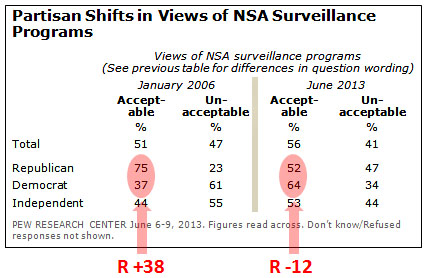One of the hot themes of the day is calling out hypocrisy on the NSA spying story: Republicans used to love it when Bush was in charge, but now it’s an assault on our freedoms when Obama is in charge. Democrats are the same in reverse. Dave Weigel writes about this here, Michael Gerson warns his fellow Republicans about it here, and Glenn Greenwald berates Democrats about it here. Plus, of course, we can back this up with hard numbers from that  infamous Pew poll earlier this week showing that Republican and Democratic attitudes have swapped sides over the past few years.
infamous Pew poll earlier this week showing that Republican and Democratic attitudes have swapped sides over the past few years.
As it happens, I think this narrative is being exaggerated a bit as the media enters feeding frenzy stage. Still, there’s plainly something to it. So what about me? Have my views changed? I’d probably have to dig pretty deeply into my archives to know for sure, but for what it’s worth, here’s my position as best as I can reconstruct it:
- My basic view hasn’t changed: I didn’t like this stuff back in 2005 and I don’t like it now. I doubt very much that the benefit is substantial enough to justify the rather obvious potential for abuse.
- At the same time, I never viewed NSA’s surveillance programs as self-evidently worthless. My best guess is that they provide genuinely useful information and probably really do help detect/prevent terrorist activity.
- What’s more, part of my objection to the program in 2005 was that it involved warrantless surveillance. Like it or not, that’s changed. Congress essentially gave its blessing to the program in 2008 and, as Glenn Greenwald confirmed last week, it’s now done under the aegis of warrants lawfully issued to telcos (for the phone record program) and tech companies (for the PRISM program).
- On a personal note, I’ll confess that it’s hard to sustain a feeling of outrage over this. We had a huge fight about all this stuff five years ago and we lost. Now everyone is supposedly shocked, shocked that NSA is hoovering up huge amounts of private data. Well, of course they are. We lost.
- But despite my personal fatigue over this—something I won’t pretend to be proud of—I’m glad that Edward Snowden has put these programs back in the spotlight. It gives better folks than me a second bite at the apple of public opinion.
On another note, Glenn Greenwald keeps promising that there are more blockbusters to come that are even more blockbusterish than what he’s revealed so far. Given that, it’s probably wise for everyone to hold off on any final judgments for now. Let’s wait a bit and see what he has for us.

















